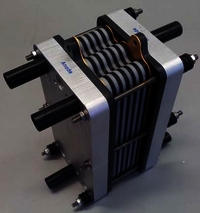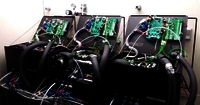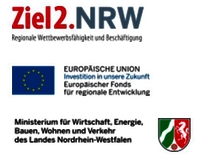Bipolar plates made of a compound core and a sealing framework developed have now been successfully qualified in continuous operation. This result of the project "Development of multi-component bipolar plates with integrated seal for PEM fuel cells", which was conducted from 2010 to 2014 together with the company GEWEKU from Halver and the Institute IPE at the University of Duisburg-Essen, represents a further step towards the production optimization of fuel cell stacks.
Bipolar plates for PEM fuel cells are to carry out different functions and therefore different functional areas: the core plate has to be electrically and thermally conductive and has to include channel structures to supply the media to the reaction zones. These functions are fulfilled by a highly filled graphite compound ideally. Injection moulding only this core part of the plate without media supply holes leads to significant reduction of the injection pressure. The outer part of the plate has to take the sealings and includes holes for media delivery through the stack. This peripheral region does need not be conductive and is ideally made of a cheap and flexible plastic material processable also by injection molding.
In this project, a multi-component injection moldable bipolar plate was developed and tested with the sealing function integrated. The mechanical link between the core and the peripheral part in addition to precise seal heights have been the most critical requirement with the highest risk potential. A safe compromise between the selected materials of the core and the edge region as well as the mechanical connection between the two parts was developed. By special design components of the plates the assembly of the stack was significantly accelerated. In cyclizing long term in situ experiments the technology was successfully tested for high efficiency and stability.
The technology has been presented at various trade shows, ZBT offers this technology and Know-How to partners within projects and contract development.
The work was carried in the stack development group of the department fuel cell and systems which is responsible for the development of fuel cell stacks and all mechanically relevant components (gaskets, plates). Components and stacks are constructed using current CAE tools as well constructed for prototypes by means of production technologies like injection molding, milling, dispensing or screen printing. The experiences from the field of fuel cell stacks are also being applied for electrolysis stack and innovative battery technologies such as the redox flow battery.
- Department fuel cells and systems
- Compound-Bipolar plates
- Service: Characterising components









